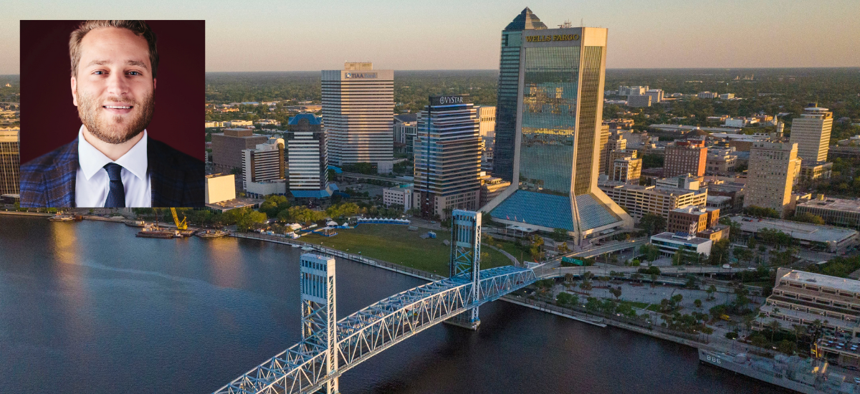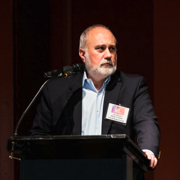Five Questions for Florida Times-Union columnist Nate Monroe
Recent disclosures show the newspaper columnist was put under surveillance after writing on the possible sale of Jacksonville’s public utility.

Photo illustration by Benjamin Taha/City & State. Photos by Visions of America/Joseph Sohm/UCG/Universal Images Group via Getty Images and Florida Times-Union (inset).
Journalists are used to pushback, sometimes expressed with anger, for what they write from the people and agencies they cover. Surveillance? Not so much. But that’s what happened to Nate Monroe, metro columnist for the Florida Times-Union newspaper and jacksonville.com. Monroe had been writing critically and in depth in the past few years about attempts to privatize the JEA public utility, which at one point involved Florida Power & Light’s parent company as a suitor. That process eventually foundered amid inquiries by the FBI and the city.
As Monroe’s own paper reported in June, “An Alabama consulting firm that worked for Florida Power & Light during the attempted sale of JEA possesses records on … Monroe that show extensive research into his personal life and indicate he was under surveillance in the fall of 2020. … The batch of leaked records included a photo of Monroe and his then-girlfriend that was taken without their knowledge while they walked their dog just outside their home.”
Eric Silagy, the CEO of FPL, told the newspaper and other reporters that his company “never directed anyone to watch” Monroe. And the owner of Matrix, the consulting firm, said he never approved the surveillance and digging into Monroe’s personal life. And yet, it happened. University of Florida journalism instructor Ted Bridis called it “really creepy” at best, “un-American” at worst.
With that, City & State has five questions for Nate Monroe (questions and answers have been edited for clarity and brevity):
You’re not a straight news reporter but you’re also not a traditional opinion columnist. How did your hybrid position come about?
My official title is metro columnist, which harkens a little bit back to some older traditions in the newspaper industry, such as (Chicago’s) Mike Royko. That's sort of how I've tried to model the job. And I am one of two metro columnists at the paper. My colleague Mark Woods also holds the title and like me does a lot of his own original reporting. I had been a reporter at the paper since 2013 and I covered City Hall for most of that time and had done some investigative work. We had a high-profile columnist that retired named Ron Littlepage and my editor was interested in filling that spot. Our paper felt the need for a voice that regularly weighed in on city politics. And she asked if I wanted to do it. It was always kind of a dream job of mine, so it was an easy decision. I took that spot in 2019 and have been off to the races since.
As a metro columnist, how did you get involved in the JEA sale coverage?
That all sort of happened very organically. When I was a reporter I had covered JEA from the day I started at the Times-Union. My original beat actually was to cover what we call in the city our independent authorities. These are basically the port, JEA, the aviation authority, the transportation authority. JEA is by far the biggest among those and had always occupied a lot of my time. And so when I was a reporter, I actually covered the rise and installation of the CEO at JEA who had orchestrated this entire privatization campaign in the first place. And as a columnist, it was a topic that was always of interest to me. I was just in a good position. I had a lot of sources that I built up over the years and had people telling me stuff. And it was a good time to put that stuff into writing and get it out into the world.
What was your reaction when you learned someone had basically worked up a dossier on you and had you secretly tailed, including watching you and your now-wife walking your dog?
Seeing that photo was … surreal is the only word I can really use. Lots of people have now seen my wife and I walking our dog. There's nothing particularly intimate or interesting about the photo. And that's also what makes it all the more creepy. That could have been anybody. That spot was where we took the dog for walks all the time, maybe a hundred feet from our front door. In some ways, I've kind of wondered, like, how did I not see this guy taking our picture? But yeah, it did feel violating and still feels violating.
At the same time, I don't understand the strategic value of following me around to a company like Florida Power & Light or their political consultants. That was probably a pretty resource- and money-intensive to do. And for what benefit exactly? I mean, that's the part of it that kind of surprises me in the end. It’s just kind of dumb and wasteful to have done that.
An old saying goes that reporters should never become part of the story. Through no fault of your own, you did. How personally are you taking this?
I'm taking it the way I think anybody would take it. I hate this phrase, but it is what it is, right? I was followed by some political consultants or at the instruction of some political consultants working for Florida Power & Light, for reasons I can only guess had to do with the reporting I was doing at the time. How I’m handling this as a reporter, as a journalist, as a columnist, the kind of personal nature of the story to me, if anything, it has actually made me a bit more conservative in how I tell the story and how I handle my reporting about the story. When I wrote my first column after we reported the existence of the surveillance operation, I was very careful to let the reporting, the documents speak for themselves. And I still feel that's the best thing to do.
But the nature of our politics is getting more dangerous, just like outwardly dangerous. And unfortunately our industries are caught in the middle of that. And so I would tell new or less experienced journalists that, you know, this is not necessarily fair, but you need to be mindful about things. Don't put yourself in a compromising position. Reporters need to be thinking about their safety and their privacy, not to be paranoid about it, but it needs to be part of the calculus in your life. I think that is unfortunately just becoming the nature of our job now.
What does what happened to you say about the state of journalism as we try to cover big-money business and politics?
That's a big question. I want to be careful to not make myself out to be this, you know, victim of massive forces. I mean, this was a bizarre incident – and, according to our reporting, was probably connected to a very large, very powerful company in Florida that does not have qualms about taking extreme steps to protect its business interests. On some level, that company is powerful in part because the state has sanctioned that power by granting it and other utilities monopolies, and the implicit bargain there is that those monopolies should be operating in the public interest. I don't think anyone can plausibly argue that following a reporter is working in the public interest.
And so I think, as I look at the story, the incident with me, a lot of the other reporting involving these consultants for Florida Power & Light and what was done or not done on their behalf, that we need to reevaluate this implicit bargain we have with these companies and really ask ourselves and ask them: Are they really operating in the public interest?
NEXT STORY: This week’s biggest Winners & Losers
